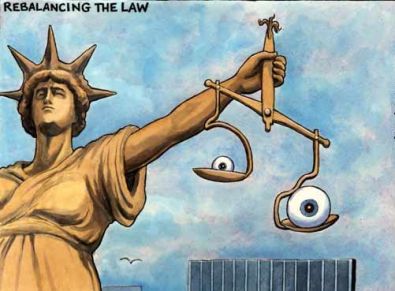
[Guardian
Unlimited, U.K.]
Jornal de Negocios, Portugal
Unlike Portugal, America Knows How to Punish the Guilty
"In the United States, financial
crimes are punished with disturbing violence. Ö we [in Portugal] donít know how
to punish. We donít know how to do it in the courts, in schools or in companies.
Our incapacity to effectively punish has significant social costs - it makes us
unjust toward both the innocent and the guilty."
By Jorge Brito Pereira
†††††††††††††††††††††††††† ††††††††††††
Translated By Brandi Miller
February 6, 2009
Portugal
- Jornal de Negocios - Original Article (Portuguese)
In the United States, financial
crimes are punished with jarring violence. Looking at just a few of the cases
which in recent years have recieved most media attention, Bernard Ebbers [video in photo box], the
former CEO of WorldCom, was sentenced to 25 years in prison; Andrew Fastow, the
former CFO of Enron, was sentenced to ten years in prison (later reduced to six),
and with him 14 other high-ranking officials from the company were sentenced;
L. Dennis Kozlowski and Mark H. Swartz, former CEO and CFO of Tyco
respectively, were sentenced to eight to 25 years in prison; John Rigas, founder
of Adelphia Communications and his son Thimoty were sentenced to 17 and 12
years in prison respectively; the popular TV host Martha Stewart was sentenced
to five months in prison (and three months house arrest) for having lied about her
motives for selling of 3928 shares of ImClone Systems, a company run by a
friend, Sam Waksal, shortly before just a bit of bad news caused the stock
price to fall. The list is endless.
But much more disturbing than
the violence of these sentences, is to see the difficulty we have in Portugal criminally
punishing those behind financial crimes, and more generally, scandals covered by the press. The
phenomenon, which is more noticeable in regard to financial crimes - is a topic
that perhaps still exist for reasons of public censorship (or a lack thereof). This
helps explain why these misdeeds are relativized along with many other types of
crimes, with the reasonable exception of blood crimes.
Every time news appears
in the press about possible criminal action involving a public figure, the
first reaction is invariably a popular lynching. Typically, there is a deafening
social roar that clamors for the application of exemplary, disproportionate and
inappropriate punishment. Since justice is slow and indelicate in its application,
this first stage can last for months or years, and only cools when the targets,
after seeing - often belatedly - that the great fire has burned out, remove
themselves from the public square. Only a few realize this in time - and
thus escape only slightly singed.
The second stage - certainly
the most dramatic - is the legal process. While the fire fed by media accusation is
genuinely hellish, with the verdict, we also invariably see the fire die down. When
there is little left but ashes, the process becomes a bureaucratic nightmare in
which the rules designed to protect the accused are used and abused by the defendant;
years and thousands of pages of proceedings later, even a model case is transformed
into a process with divided results, and where the public no longer knows where
fault lies.†
Posted by WORLDMEETS.US
The truth is that we [in Portugal]
donít know how to punish. We donít know how to do it in the courts, in schools
or in companies. This is in our soul and our blood; it is part of our culture
and our being; we are inquisitors and promoters of redemption; we are strong
with the weak and weak with the strong; we have encompassed within ourselves both
strong and weak - and so we lose the equilibrium required to govern the
application of justice. The critique of violence of guilt that feeds the initial media
fire has the same intensity as our capacity for redemption - the mediation of human
beings characterized by our Catholic upbringing - which rsults in the form of a muddled
final pardon.
Our incapacity to
effectively punish has significant social costs - it makes us unjust toward both
the innocent and the guilty; it allows a social judgment to impose itself on
the legal process; it creates a weaker and less secure society, particularly when
compared with those that deal more justly with both guilt and punishment.
CLICK HERE FOR
PORTUGUESE VERSION
[Posted by WORLDMEETS.US
February 13, 1:47pm]